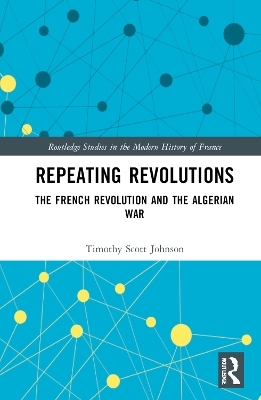
Repeating Revolutions
The French Revolution and the Algerian War
Seiten
2025
Routledge (Verlag)
978-1-032-43598-5 (ISBN)
Routledge (Verlag)
978-1-032-43598-5 (ISBN)
- Noch nicht erschienen (ca. Februar 2025)
- Versandkostenfrei
- Auch auf Rechnung
- Artikel merken
Repeating Revolutions examines how activists, intellectuals, social scientists, and historians looked to France’s Revolutionary past to negotiate Algeria’s struggle for decolonization from the 1930s to the 1960s.
The French Empire justified their claims over Algeria in part through messages of universal progress marked by the political visions tied to the French Revolution. Supporters of Algerian independence confronted those historical claims by identifying the Algerian cause with the French Revolution and by highlighting the apparent contradictions between the history of 1789 and imperial rule. Far-right activists, meanwhile, saw the movement to decolonize Algeria as another manifestation of the Revolutionary disorder stemming from the French Revolution. Behind these analogies lay broader changes in the study of North African society and contemporary political relevance of the French Revolution. The focus on analogies to the French Revolution puts different sets of actors in conversation with one another and offers a fresh take on how people’s experiences and expectations changed throughout the Algerian War.
This book will appeal to readers interested in the intellectual history of decolonization, the historiography of the French Revolution, the historiography of North African studies, and questions of historical comparison and conceptual change.
The French Empire justified their claims over Algeria in part through messages of universal progress marked by the political visions tied to the French Revolution. Supporters of Algerian independence confronted those historical claims by identifying the Algerian cause with the French Revolution and by highlighting the apparent contradictions between the history of 1789 and imperial rule. Far-right activists, meanwhile, saw the movement to decolonize Algeria as another manifestation of the Revolutionary disorder stemming from the French Revolution. Behind these analogies lay broader changes in the study of North African society and contemporary political relevance of the French Revolution. The focus on analogies to the French Revolution puts different sets of actors in conversation with one another and offers a fresh take on how people’s experiences and expectations changed throughout the Algerian War.
This book will appeal to readers interested in the intellectual history of decolonization, the historiography of the French Revolution, the historiography of North African studies, and questions of historical comparison and conceptual change.
Timothy Scott Johnson is an Assistant Professor of History in the Department of Humanities at Texas A&M University-Corpus Christi. His work focuses on the intellectual and cultural history of postwar France. Previously, he translated François Ewald’s The Birth of Solidarity (2020).
Introduction 1. Debating the Revolution’s Legacy 2. The Soul of the Republic and the Algerian Crisis 3. Dual Revolutions 4. “To Be French Today Is to Be Algerian” 5. Broken Mirrors 6. Revolution and Counter-Revolution 7. Rewriting North African History 8. Constructing the Third World from the Third Estate. Conclusion: Rewriting the Revolution: Analogies as Historiographical Operations
| Erscheint lt. Verlag | 11.2.2025 |
|---|---|
| Reihe/Serie | Routledge Studies in the Modern History of France |
| Verlagsort | London |
| Sprache | englisch |
| Maße | 156 x 234 mm |
| Themenwelt | Geisteswissenschaften ► Geschichte ► Regional- / Ländergeschichte |
| Geschichte ► Teilgebiete der Geschichte ► Wirtschaftsgeschichte | |
| Sozialwissenschaften ► Politik / Verwaltung ► Politische Systeme | |
| Sozialwissenschaften ► Politik / Verwaltung ► Politische Theorie | |
| ISBN-10 | 1-032-43598-4 / 1032435984 |
| ISBN-13 | 978-1-032-43598-5 / 9781032435985 |
| Zustand | Neuware |
| Haben Sie eine Frage zum Produkt? |
Mehr entdecken
aus dem Bereich
aus dem Bereich


